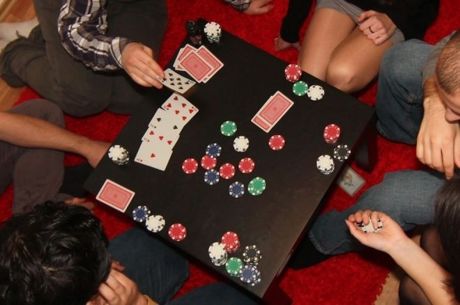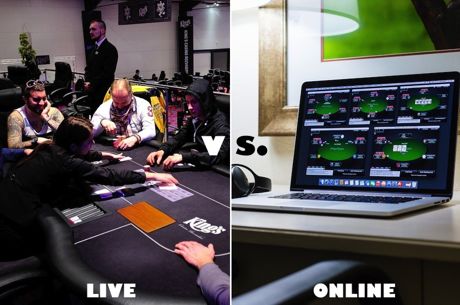Using Poker Rules For a Tactical Advantage: A Rebuttal

Earlier this week, Robert "Poker Grump" Woolley wrote about how you could use the rules of the game for tactical advantage. This caused quite a stir on social media, and PokerNews was kind enough to let me pen an "op-ed" piece on the subject.
Basically, the controversy revolved around whether Robert's suggestions amounted to "angle shooting." I have to be careful in defining angle shooting in this case because that definition lies at the heart of our discussion. But a reasonable working definition is that angle shooting is an attempt to gain an unfair advantage without technically violating the rules of the poker game.
All good and decent people in poker (and I certainly include fellow Ashevilleophile Robert Woolley in this group) abhor angle shooting. The difficulty lies in drawing the line between legitimate tactical use of the rules and angle shooting.
I should also add that angle shooting — like playing pocket jacks — is very much dependent on the context. Paraphrasing United States Supreme Court Justice Potter Stewart, "I can't define angle shooting, but I know it when I see it."
With that preamble, let's look at each situation described in Robert's article individually:
Tap, Tap, Tap
There seems to be a common nervous (and unconscious) habit in Western civilization of tapping your finger while you're thinking about something. Woolley wrote:
"A player a few seats to my right was supposed to act first. He tapped his hand on the table, and I couldn't tell if it was a 'just thinking' tap, as is seen so commonly among low-limit players…"
"Just as he reached for his whole stack — about $200 — to put it in the pot, the dealer asked, 'Was that a check?...' The player said, 'No, I'm all in!' I spoke up and said, 'It looked like a check to me.' The dealer agreed, and made him take his bet back. Everybody else checked, too."
New and lower stakes players routinely do this "thinking tap." They haven't had it drilled out of them by years of playing poker, where the table tap can be decisive and binding. I see it all the time at lower stakes games.
Twenty years ago, that tap on the table would have happened exactly once, everybody would have acted behind the player, and that would have been that. But it's 2016 now, not 1996. We are arching the rules to be gentler and kinder to newbies and infrequent players, which is exactly the thing we must do if we hope to grow the game and its popularity.
As Woolley's story turns out, the free look at the turn gives him the nut flush and he busts the guy who had flopped a set. How do you think that guy is going to feel? Just because he unconsciously tapped on the table, and some table lawyer caught him, he ends up losing his whole stack.
Is he going to tell his friends how fun the game is? Is he going to encourage them all to come play in the poker room rather than blow their money in the pit?
Now before you say "It's just the rules of the game," you should know that I have advanced certifications in "Table Lawyering" and "Game Captaining." And dozens of witnesses happy to so testify from 1996 and before.
But as the rules have moved toward kinder and gentler treatment of the new and infrequent player, so has my attitude. This is a game and it's supposed to be fun. I know that technically the dealer shouldn't be asking "Is that a check?" Why not? Because it allows the player to decide right then and there if it's a check or not. It's kind of a "string check" action, allowing him a shot to see what people do to his left before committing.
But Woolley even says "and I couldn't tell if it was a 'just thinking' tap." In short, it was fairly obvious to me that the player in question was a newbie, the tap was an unconscious reaction of his nerves ("Oh my god, I've flopped a set"), and he wasn't trying to shoot an angle.
Given that, the dealer's question was wholly appropriate and we, as veteran players, should cut such people slack. Let the man do what he intended to do, even if he unconsciously (but not maliciously) broke the rules.
I'll also admit that Woolley's saying "It looked like a check to me" in that particular situation struck me as uncomfortably close to an angle in itself. Again, I'm speaking as somebody who wasn't there and didn't know the context.
Of course, if I have any suspicion that this "thinking tap" is the preamble to an angle, then I have a completely different response. And honestly, if you can't quickly spot somebody who is using the table tap as an angle, you probably shouldn't be in a poker game for money.
Protect your cards
The short version of this story is that Woolley raises, it folds to the player in the big blind who looks at his cards and then puts them back down again, a bit forward of where they were to start. But the player doesn't protect them. The dealer interprets this as a fold, drops the deck on the cards, and pushes the two blinds to Woolley. The big blind protests he didn't mean to fold.
Is that extra 1.5 big blinds Woolley's? Yes.
Are the rules (every rule book, pick your favorite) clear that the player has an obligation to protect his hand? Indubitably.
Do I protect my cards? Every single hand, every single time. Without fail.
The rules are clearly on Woolley's side. The more important question (to me) is "What is the best thing to do?" I don't think you can be "wrong" by insisting that the rules be followed to your benefit, but again, how much is that 1.5 big blinds worth to you? Is it worth causing the tournament to hit a giant pothole? Is it worth upsetting the guy in the big blind and making a scene at the table?
To me, the A+ response here is to give the guy his big blind back (again, if you don't suspect angling going on) and get on with the show. Of course, the next time he does it, you're up and out of your chair. But you won't have to be because the dealer (remembering your gracious move the previous time) will tell the guy "Hey buddy — protect your cards next time."
Showing your cards
In the last scenario Robert presents, you're on the button and the river action checks around. According to the rules at most poker rooms, if there's no betting, then the obligation to show your cards begins with the first person to act. Woolley says "If you're on the button, stand your ground. You don't have to show unless you have a winner because everybody else is required to show first."
He's 100% right. Now, here's my take:
When I'm in a hand that checks all the way around, as soon as I'm sure that the action is done, I snap-announce my hand and turn it up. That's true even if I'm on the button. Why?
- Vita brevis my friends. I've been in too many games of chicken where everybody is waiting to see what the other guys and gals show down before they act. I don't have enough time left on the planet to wait while everybody stares at each other, we have arguments about who has to act first, etc.
- Do you really think you're giving up that much of an edge by showing down one hand ahead of everybody else in a checked-down pot? Seriously?
- And what if you are giving up that edge? Is the edge you're giving up worth the reduced fun, enjoyment, and speed of the game? (A fast poker game is a fun poker game).
- Finally, if you really need a monetary basis for your decision (do you really?), then answer this question: Have you ever overlooked or misremembered a winning hand? Nah, me neither. Because by slapping that thing pips-up on the felt means it gets read by the dealer and everybody. Just in case it's that one time in your poker career that you misremembered or misread your hand.
Summary
In fairness to Robert, he has an extended section at the end where he says that it's important to be aware of the context of the situation. Quoting him:
"The fact that you can invoke these and other rules to your own advantage does not necessarily mean that you should. You have to take into consideration the formality of the setting, what's at stake, how much of an advantage you're giving yourself, and how insisting on strict adherence to the rules will affect your table image, your general reputation, and the tone of the game."
But I would take it a step further. It's not always about your table image, your general reputation, or the tone of the game. Sometimes… sometimes, it's just about the fact that it's a game we're playing, life is short, and good times can be hard to come by.
It can also be about "grace" — the giving of undeserved favor. I'm telling you, for a fact, that grace is far too rare in this world. If you have the ability to bestow a little in your poker game, you may be doing the universe a favor which more than makes up for a shekel or two less that ends up in your pocket.
Be sure to complete your PokerNews experience by checking out an overview of our mobile and tablet apps here. Stay on top of the poker world from your phone with our and Android app, or fire up . You can also update your own chip counts from poker tournaments around the world with MyStack on both Android and iOS.









